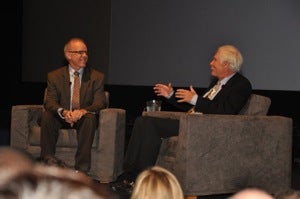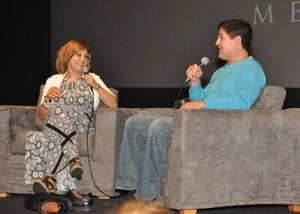Mark Cuban lobbied for movie studios to buy theater chains. Producers bemoaned the state of the industry. Pixar showed off the tie-ins and promotions it’s creating for “Toy Story 3."
But that was just the tip of the iceberg at the Produced By Conference over the weekend on the 20th Century Fox lot. The conference, which was launched by the Producers Guild of America last year, hosted panels on everything from movie financing to digital distribution, 3D to DIY. Vendors offered software, military consulting and enticements to shoot around the country and around the world, and even dispensed some free legal advice.
We’ve already covered a few highlights, but here are more of the goings-on during the two days attended by 1,100 PGA members, speakers, students, guests and press.
*
 Dropouts and no-shows were a problem on the first day. One of the marquee panels on Saturday morning was to be titled “Creative Alchemy,” which had been billed as a conversation between producer Brian Grazer and director Ridley Scott about the producer/director relationship. But Grazer and Scott both dropped out, the latter only four days before the start of the conference.
Dropouts and no-shows were a problem on the first day. One of the marquee panels on Saturday morning was to be titled “Creative Alchemy,” which had been billed as a conversation between producer Brian Grazer and director Ridley Scott about the producer/director relationship. But Grazer and Scott both dropped out, the latter only four days before the start of the conference.
Also originally scheduled but missing in action: Matthew Weiner (“Mad Men”), Laura Ziskin (“Spider-Man”) and Jane Rosenthal (“Meet the Fockers”).
But the Scott/Grazer no-show was the most notable one, since the entire panel was to have centered on the relationship between the two men.
David Picker, the moderator of the panel, said that after the pair dropped out he spoke to four producers, each of whom promised that they’d deliver a director with whom they had a close relationship – but none of the four could actually find a director who was able to appear.
In the end, Picker assembled three producers – Larry Gordon, Doug Ward and Bruce Cohen – to gather in the studio’s Daryl F. Zanuck Theater and talk about alchemy from the producers’ side of the equation. (Photo above)
“First of all, you guys are lucky that you got us instead of the two guys who got off,” said the irascible, 74-year-old Gordon at the beginning of the panel. “What I just said was funnier than anything you would have gotten in two hours from those guys.”
*
 Most of the events were held at stages along 9th Street on the Fox lot. That street was also lined with exhibition booths showcasing 11 film commissions, a handful of organizations and more than two dozen financing, production, post-production, software and consulting firms.
Most of the events were held at stages along 9th Street on the Fox lot. That street was also lined with exhibition booths showcasing 11 film commissions, a handful of organizations and more than two dozen financing, production, post-production, software and consulting firms.
Traffic was steady all along the street, but two of the most eye-catching displays sat at the west end, by Fox’s Daryl F. Zanuck Theater. On one side of the street sat a gleaming, 35-foot silver automobile that said “Packard” on the side, though it looked more like a Flash Gordon spaceship than any Packard that had ever existed.
The car, built to run on the Bonneville Salt Flats, had never been used in a movie. But for Damon Picture Vehicles, it was an easy way to attract attention, though the numerous “Do Not Touch” signs discouraged attention of the tactile kind …
Directly across the aisle was an array of weaponry, uniforms and combat gear courtesy of the Tactical Media Group, a company of military veterans offering technical advising and weapons choreography to film and television projects.
Some of the staffers at Tactical dressed in dark outfits that seemed to say authority – but on Sunday, one came to work in full military fatigues.
Late in the day, a TMG rep huddled with a couple of producers and told them about the time he’d trained an unnamed actor to shoot automatic weapons, and then appeared in an action film.
“I got through about four clips,” he said, “in the time it took the star to get through half a clip.”
*
At a panel on transmedia, David Eick (“Battlestar Galactica”) said the changing entertainment landscape has opened up more opportunities.
“You’re no longer limited by where you can pitch, where you can sell,” he said. “You can invent a game that becomes a movie. You can do a webisode that becomes a series …
To me, it boils down to, how can you create something that the audience is not going to call bulls— on?”
But, added Cary Granat of Bedrock Studios, the transmedia content – webisodes, video games, books, etc. – needs to support the central creative work, whether it’s a television show or movie.
“You have to make sure the other activities are helping sell the main product, or studios won’t want to be distracted,” he said. “And the studios at this point can point to examples where the transmedia wraparound damaged the core product: that videogame wasn’t up to the standards of the movie, that book gave away the ending … ”
*
 Ted Turner sat for a conversation with Variety editor Tim Gray on Saturday afternoon, focusing largely on his charity efforts, and even his restaurant chain that sells bison meat.
Ted Turner sat for a conversation with Variety editor Tim Gray on Saturday afternoon, focusing largely on his charity efforts, and even his restaurant chain that sells bison meat.
By the end of the session, Turner’s answers were getting so terse, and almost vaguely combative at points. When Gray asked him what he thought of television news, he shrugged. “Some is good, some isn’t,” said the 71-year-old media mogul.
“I’m sure there are some people who are watching too much television, but I’m sure as hell not one of them,” he said. “The only thing I watch is a little bit of CNN. I’m too busy trying to change the world.”
*
“The first thing I want to share with you,” said Michelle Martell, the COO of the Cinedigm Entertainment Group, “is film is dead.”
To scattered boos from the audience, she shrugged. “I’m sorry,” she said. “We didn’t do it.”
Martell was moderating one of the midday presentations devoted to specific companies showcasing their wares. In her case, the panel, “Digital Cinema and You,” dealt with the way in which Cinedigm managed the transition from film to digital projection in theaters: rather than forcing theaters to spend the money to upgrade each screen, Cinedigm puts up the money for the entire conversion; then, every time its new digital system is used, the company gets a fee.
The stats: of the 39,000 screens in the United States, about 8,400 are currently digital. In the next three years, she said, they expect 25,000 more digital screens.
For most of the panel, the key was that digital enables 3D, and 3D makes everything possible, from live sports and concerts to 3D television series that could arrive within the next couple of years.
Which is not to say that 3D television has quite figured out how to make money, the way the 3D surcharges do in movie theaters.
“At this point,” said Jerry Steinberg from Fox Sports, “it’s still a technology in desperate search of a business model.”
*
 The Fox commissary, which is known as one of the better lunchrooms on the Hollywood studio lots, was closed during the conference so that the space could be transformed into a setting for panels and presentations.
The Fox commissary, which is known as one of the better lunchrooms on the Hollywood studio lots, was closed during the conference so that the space could be transformed into a setting for panels and presentations.
Instead, lunch was served at several long tables, where attendees had to buy tickets that could then be exchanged for boxed meals. For 10 tickets (at a buck a ticket), guests had their choice of a couple of different salads or a handful of hot and cold sandwiches. The sandwiches came with a bag of chips, an apple, a cookie and a drink.
Plus packets of mayo, a little napkin, and some plastic utensils.
In other words, it was all a far cry from the Grill on the Alley.
*
After lunch on Saturday, a panel entitled “Producing Blockbusters” gave precious little practical advice – perhaps because if you’re in a position to produce a blockbuster, you probably don’t need a panel to help you out.
Instead, the 90-minute session was a biographically-oriented homage to its three panelists: Mark Johnson (“Rain Man,” “The Chronicles of Narnia”), Larry Gordon (“48 Hrs.,” “Die Hard”) and Richard F. Zanuck, (“Jaws,” “Alice in Wonderland”).
Gordon was the most outspoken, but Zanuck had the longest history: when moderator Jon Jashni asked the group for the turning point before which their career might have gone in a different direction, Zanuck laughed and replied, “My birth.”
His father, he pointed out, was the legendary producer and Fox studio chief for which the theater in which the panel took place was named.
“As a child, I was driven onto this lot by a chauffeur so that I could sell newspapers,” he said. “And I wasn’t allowed to accept tips, or I would have made a fortune.”
*
Throughout the weekend, producers talked about their upcoming projects. On a panel devoted to financing independent film, Sarah Green, the producer of Terrence Malick’s upcoming “The Tree of Life,” said she and Malick will move straight into another film as soon as they finish the current one.
The film is yet untitled, and described only as “a romantic drama” – but the cast, Green said, will include Rachel McAdams, Christian Bale and Javier Bardem.
James Stern, one of the producers of “An Education,” said he’s finishing the $30 million Louisiana-set thriller “The Hungry Rabbit Jumps,” directed by Roger Donaldson and starring Nicolas Cage. Cathy Schulman (“Crash”) detailed the financing of “Salvation Boulevard,” a comedy about religion starring Pierce Brosnan, Jennifer Connelly and Marisa Tomei.
And Judy Cairo, the producer of “Crazy Heart,” appeared on a panel about international financing, then said afterwards that she’s about to head to London to start work on her next film, “Hysteria,” which will reportedly star Sally Hawkins and Jonathan Pryc.
“It’s about the invention of the vibrator in Victorian England,” she said with a laugh. “I know it sounds exploitative, but it’s not. It’s a ‘Shakespeare in Love’ type thing.”
 *
*
Three of the booths along 9th Street offered something different: free legal advice. Manned by rotating crews of entertainment attorneys from the different entertainment law firms Greenberg Traurig, The Point Media (right) and Sheppard, Mullin, Richter & Hampton, the booths had customers for most of the weekend.
“We’re not allowed to give specific legal advice, but we can talk generally,” said Edwin Komen from Sheppard Mullin on Sunday afternoon. “And we’ve had a pretty good cross-section of the kind of questions you’d expect at a conference like this.”
*
One of the liveliest guests was certainly billionaire Mark Cuban, the owner of an array of entertainment and non-entertainment companies and an outspoken fast-talker who alternated insights into the future of entertainment with ribald jokes about the “cheesy T&A” programming on his hd.net service.
 In addition to his call for vertical integration (which theWrap covered here), Cuban touched on a variety of issued raised by moderator Dawn Chmielewski of the L.A. Times:
In addition to his call for vertical integration (which theWrap covered here), Cuban touched on a variety of issued raised by moderator Dawn Chmielewski of the L.A. Times:
Netflix and Redbox: the two services, he said, did something “very, very smart”: they write content-owners a check up front for the rights to rent films and TV shows to consumers.
“Who thought that Hollywood would be giving movies to a place that rents them for a dollar a day?” he said of Redbox. “but if you hand somebody a check for $15 million, a lot of morals go out the window.”
Mobile entertainment: Viewing movies and TV shows and video content on cellphones and mobile devices, said Cuban, will never replace theatrical or television or any other viewing habits.
“Mobile is not going to replace anything,” he said. “It’s always going to be a complementary device – it’s going to be the equivalent of the newspaper or magazine you take to the bathroom.”
The Internet as the future of entertainment: It’s not going to happen, he said. “If you think about it, it’s been 15 years. Over the last three or four of those years, what has really changed about the Internet? It’s a stable utility.”
With that stability, he said, comes a certain boredom that makes the Internet a valuable platform, but one unlikely to spawn any major innovations, despite the best efforts of a wide variety of entertainment and tech companies.
“I have a rule,” he says. “If you look in the same place where everybody else is looking, you’re looking in the wrong place.”
3D television: A prime opportunity – but on the low end, not the high end. “That’s a great opportunity for a producer. We’re going to see pro-sumer models available by January or February, and there’s going to be a dearth of content. Places like Direct TV are going to have a channel in 3D, and they’re going to be looking for content.”
The effect of the economic downturn on media companies: Despite the cutbacks and downsizing done in recent years, he doesn’t see a long-term change. “I think [the industry] looks the same. At some point the economy will pick up, and then it’ll get stupid again.”
Socially-conscious entertainment: Asked how much interest he had in using films and television to effect social change, Cuban (whose company Magnolia has released a number of issue-oriented documentaries) was blunt.
“None,” he said. “Maybe I’ll be at the gates of hell, I don’t know.”
He paused. “I have a bigger theme. I think the most patriotic thing you can do is get f—ing rich. I pay more taxes than you can possibly believe.”
And then he talked about writing checks for people who needed organ transplants but didn’t have the money, and about the films he’s released from Alex Gibney … so the guy is probably not quite as heartless as he likes to act.
Oh, and he thinks the Lakers will win the NBA championship if the referees call the games tightly, while the Celtics have the advantage if the refs back off.
*
 On the eve of the conference, the Producers Guild held an election. And if Sunday’s “Where Do Producers Go From Here?” panel is any indication, the guild is about to get a lot looser.
On the eve of the conference, the Producers Guild held an election. And if Sunday’s “Where Do Producers Go From Here?” panel is any indication, the guild is about to get a lot looser.
The two panelists, interviewed by PGA executive director Vance Van Petten, were the guild’s outgoing president (and newly anointed president emeritus), Marshall Herskovitz, and one of its incoming co-presidents, Mark Gordon.
Herskovitz was earnest and professorial, while Gordon was a relentless joker who liked to mess with people. While Herskovitz tried to explain, step-by-step, how a neophyte producer could develop a piece of material, Gordon kept interrupting, making jokes and going off on tangents.
And when Van Petten asked for help from the other incoming co-president, Hawk Koch, who was sitting in the front row, Koch just shrugged. (Koch and Herskovitz, above)
“I don’t know what the hell you guys are talking about,” he said.
*
But Gordon wasn’t all tomfoolery; he also offered some advice to aspiring producers.
“Use everybody you can,” he said. “Take every advantage you can. Whoever you know, whoever your father knows, whoever your girlfriend knows. It’s too hard not to use every advantage you have. You have to be aggressive, you have to be annoying … ”
At the Q&A following that ended the Herskovitz/Gordon panel, a woman in the audience stood up and said that she had an idea that would be perfect for a scripted series for HBO or Showtime. How, she asked, should she present that idea?
“See that guy next to you?” said Gordon, pointing into the audience. “That’s Tim Gibbons, the producer of [HBO’s] ‘Curb Your Enthusiasm.’ Talk to Tim. He knows.”
He grinned ear-to-ear. “Networking!” he shouted. “That’s what this conference is all about!”
(Gordon/Wick/Cohen/Picker, Ted Turner, street scene, Mark Cuban and Koch/Herskovitz photos by Michael Quinn Martin.)
